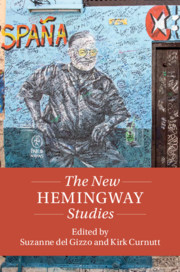Book contents
- The New Hemingway Studies
- Twenty-First-Century Critical Revisions
- The New Hemingway Studies
- Copyright page
- Contents
- Contributors
- Introduction Hemingway in the New Millennium
- Part I The Textual Hemingway
- Part II Identities
- Chapter 6 Family Dynamics and Redefinitions of “Papa”-hood
- Chapter 7 Hemingway and Pleasure
- Chapter 8 Trauma Studies
- Chapter 9 Hemingway and Queer Studies
- Chapter 10 Hemingway, Race(ism), and Criticism
- Chapter 11 Still Famous after All These Years
- Part III Global Engagements
- Works Cited
- Index
Chapter 8 - Trauma Studies
Neurological and Corporeal Injuries
from Part II - Identities
Published online by Cambridge University Press: 30 August 2020
- The New Hemingway Studies
- Twenty-First-Century Critical Revisions
- The New Hemingway Studies
- Copyright page
- Contents
- Contributors
- Introduction Hemingway in the New Millennium
- Part I The Textual Hemingway
- Part II Identities
- Chapter 6 Family Dynamics and Redefinitions of “Papa”-hood
- Chapter 7 Hemingway and Pleasure
- Chapter 8 Trauma Studies
- Chapter 9 Hemingway and Queer Studies
- Chapter 10 Hemingway, Race(ism), and Criticism
- Chapter 11 Still Famous after All These Years
- Part III Global Engagements
- Works Cited
- Index
Summary
In “Trauma Studies: Hemingway’s Neurological and Corporeal Injuries,” Sarah Anderson Wood examines the way recent developments in trauma studies and increased awareness of mental health issues have enhanced and sometimes reframed Hemingway scholarship about his mental and physical health over the course of his life, but particularly in regard to the author’s rapid decline in the late 1950s and early 1960s. Trauma studies, Wood contends, has informed advances in medical science, in psychiatry, in the historicity of treatment and therapy, and simply in the artistic representation of pain, all of which have impacted scholars’ understandings of Hemingway’s relationship to suffering. Wood also points to studies that are exploring the impact these conditions may have had on his later writing and to the potential of the burgeoning field of epigenetics, which looks at gene expression and not simply genetic coding. She pays particular attention to Andrew Farah’s Hemingway’s Brain and Linda Wagner-Martin’s Hemingway’s Wars: Public and Private Battles (both 2017).
Keywords
- Type
- Chapter
- Information
- The New Hemingway Studies , pp. 130 - 145Publisher: Cambridge University PressPrint publication year: 2020

